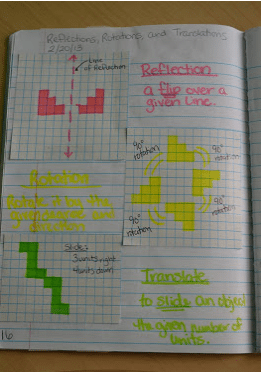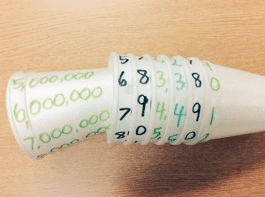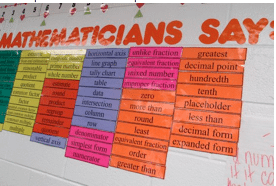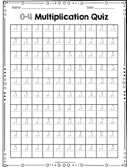As a new teacher, teaching math can be the most challenging subject on the agenda. I know the steepest learning curve I had to tackle my first year was how to be a clear, effective math teacher. I generally like and understand math, and I consider myself fairly competent at it, but I quickly learned that being good at math and being a good math teacher were two entirely different matters.
We asked a panel of experienced teachers what they know about teaching math that they wish they had known at the beginning of their career and this is what they told us:
1. Do math notebooks—the right way.
“Teach students how to write good math notes. Students seem to think the math notebook is all scratch paper when they’re not taught correctly. In high school, we were expected to write down the date, unit and lesson as well as vocabulary. Students aren’t being taught good note-taking skills and it is one thing I never learned how to teach. Nor even though that I would have to!” —Rachael M.

SOURCE: Teaching in Special Education
2. Focus on building skills.
“Remember that math is one of those subjects that builds and goes from very straightforward to complex at the drop of a hat. Go slow to go fast, just like in the Daily 5, as you aren’t teaching a set of facts, but rather a set of skills that needs to be honed.” —Matthew S.
3. Place value and number sense are the foundations for everything else.
“Place value and math fluency are critical. By the time you get to fourth grade or higher, you have to have the number sense and place value of larger numbers. If you can’t add/subtract/multiply, then your brain can’t focus on the new concepts because the computation takes all the focus. Guided math/math workshop is critical for instruction to fill in the gaps.” —Melana K.
“If K-2 teachers spent the majority of their time helping kids develop their number sense, teachers in the upper grades would have it made.” —Christina GM.

SOURCE: Magical Maths
4. Release gradually.
“Spend plenty of time in the gradual release model. Don’t rush independent practice. Hang out in the ‘we-do’ stage if necessary. Move from teaching a subject concretely with manipulatives, into drawing picture representations, then the abstract algorithm. Different students might need to hang on to concrete representatives longer than others. Give a daily formative assessment to plan small groups for the following day.” -Jacqui V.
5 Make vocabulary instruction explicit.
“Teaching the vocabulary for a unit was something that I used to skip over. Turns out, my kids who are verbal learners have more success solving math problems when they have words to describe abstract math operations and concepts.” —Karen N.

Source: Scholastic
6. Emphasize math reasoning over “tricks.”
“Rather than teaching formulas and shortcuts, focus on developing math reasoning and sense making skills. Draw pictures, use manipulatives and have conversations about what a problem is asking for and what sort of answer makes sense. Use concepts embedded in problems as the reference point for deeper learning.” —Kristin G.
7. Trust your instincts.
“Some sources don’t recommend weekly timed tests, but my students LOVED them for basic math facts. They would get so excited about beating their last score. As a math teacher, you have to find what works for individual kids.” —Mike C.

SOURCE: Ashleigh’s Education Journey
8. Make use of daily objectives.
“I learned to be very focused with my lesson plans. Math is a subject that lends itself very well to setting clear, concrete objectives day by day. Post them on the board. Talk about them with the kids. Help them understand what it is you are working on each day and why.” —Michael W.
9. Find mentorship and professional development.
“I’ve learned so much about teaching math over the years from the colleagues at my school as well as those in my local NCTM Affiliate. You don’t have to reinvent the wheel every time you want to teach a new concept. You can learn from best practices and one another. My energy is always renewed after spending time with colleagues who all want their students to succeed.” —Lori C.
10. Know that everyone can succeed.
“There is a common belief that math comes more easily to some than others, but really anybody can learn it. It just takes time, practice and motivation. Math instruction is especially helpful for ESL kids. Because it is more concrete than language learning, the material is more intuitive. It leads to success which leads to confidence. I really think math is the easiest subject to get kids excited about. Being able to demonstrate knowledge makes kids hungry for more.” —Maggie M.
What do you wish you had known as a new math teacher? Share in the comments!

